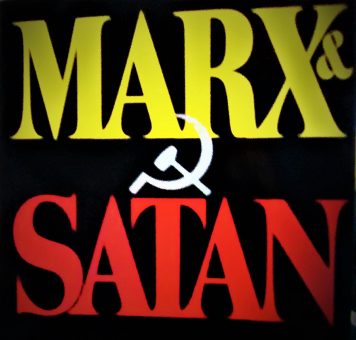Engels said, “Generalized love of men is absurdity.” The anarchist thinker Max Stirner, author of The I and I is Property and one of Marx’s friends, wrote, “I am legitimately authorized to do everything I am capable of.”
Communism is collective demon-possession. Solzhenitsyn in The Gulag Archipelago reveals some of its horrid a results in the souls aid lives of people.
The Mythical Marx
Let me say again that I am conscious that the evidence I have given to date may be considered circumstantial. But what I have written is enough to show that what Marxists say about Karl Marx is a myth. He is not prompted by concern for the poverty of his fellowmen, for which revolution was the only solution. He did not love the proletariat, but called them “nuts,” “stupid,” “asses,” “rascals,” even obscenities. He did not even love his comrades in the fight for communism. He called Freiligrath “the swine,” Lassalle “Jewish nigger,” Bakunin “a theoretical zero.”
A Lieutenant Tchekhov, a fighter in the revolution of 1848 who spent nights drinking with Marx, commented that Marx’s narcissism had devoured everything good that had been in him.
Marx certainly did not love mankind. Giuseppe Mazzini, who knew him well, wrote that he had “a destructive spirit. His heart bursts with hatred rather than with love toward men.”
Mazzini was himself a “Carbonari.” This organization, founded in 1815 by Maghella, a Genoan Freemason, declared its “final aim to be that of Voltaire and of the French Revolution – the complete annihilation of Catholicism and ultimately of Christianity.” It began as an Italian operation, but subsequently developed a broader European orientation.
Though Mazzini was critical of Marx, he maintained his friendship with him. The Jewish Encyclopedia says that Mazzini and Marx were entrusted with the task of preparing the address and the constitution of the First International. This means that they were birds of the same feather, though they sometimes pecked at each other.
I know of no testimonies from Marx’s contemporaries that contradict Mazzini’s evaluation. Marx the loving man is a myth constructed only after his death.
In fact, his favorite bit of verse was this quotation from G. Werth: “There is nothing more beautiful in the world than to bite one’s enemies.” In his own words, he said outright, “We are pitiless. We ask for no pity. When our turn comes, we will not shun terrorism.” These are hardly the sentiments of a lover.
Marx did not hate religion because it stood in the way of the happiness of mankind. On the contrary, he simply wanted to make mankind unhappy in this world and throughout eternity. He proclaimed this as his ideal. His avowed aim was the destruction of religion. Socialism, concern for the proletariat, humanismthese were only pretexts.
Pages: 1 2 3 4 5 6 7 8 9 10 11 12 13 14 15 16 17 18 19 20 21 22 23 24 25 26 27 28 29 30 31 32 33 34 35 36 37 38 39 40 41 42 43 44 45 46 47 48 49 50 51 52 53 54 55 56 57 58 59 60 61 62 63 64 65 66 67 68 69 70 71 72 73 74 75 76 77 78 79



